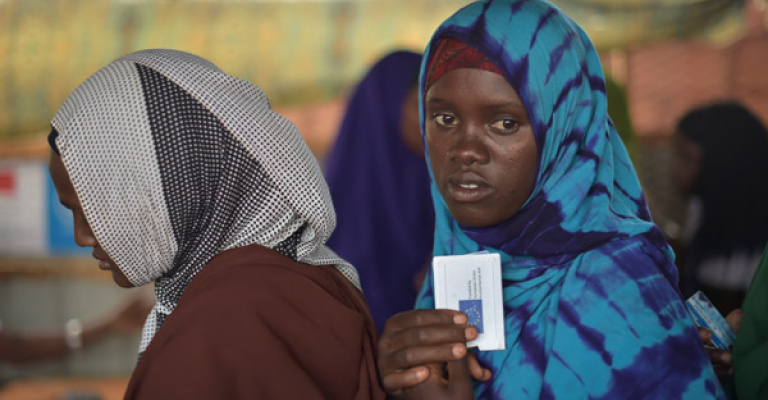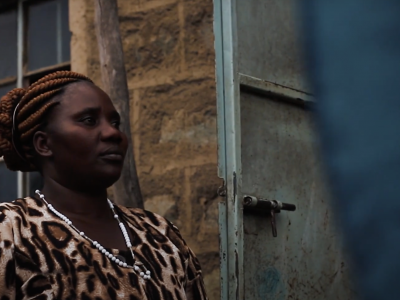
Path to Zero Hunger: Cash-based programming, human-centred development and localisation
In this blog for ECDPM, Dominique De Bonis, Senior Policy and Programme Officer at the UN World Food Programme, argues that cash transfers can empower people and nations to tackle the root causes of hunger in line with local preferences and priorities.
Nations around the world are deeply committed to Agenda 2030 and meeting the Zero Hunger Challenge. Yet, while noticeable progress has been made against many critical SDG targets, for the third year in a row the world has witnessed a rise in world hunger. In 2017, the number of people facing chronic food deprivation reached 821 million.
In a world where WFP (World Food Programme of the United Nations) remains committed to achieving food security and nutrition outcomes for the most vulnerable, operating in the face of increasing demand but decreasing resources means innovative and effective ways of scaling up support to address humanitarian needs must be found.
Where markets are functioning, cash can be an effective path to food security. Providing people with cash empowers them to meet their food, nutrition and other essential needs, according to their own priorities and preferences. Providing cash puts people at the centre of humanitarian aid and promotes financial inclusion of the poorest and most vulnerable, while the injection of cash strengthens local markets and country systems.
Cash-based transfers (CBT) can be delivered in physical form or digitally, and include assistance distributed as physical bank notes, e-money, mobile money, through debit cards or value vouchers which are redeemable at locally contracted merchants. This flexibility – coupled with rapid growth in digital and financial technologies – has allowed WFP to integrate cash into many of its own humanitarian and development programmes. Today, one-third of WFP’s portfolio relies on cash, figures having increased from US$10 million in 2009 to US$1.75 billion in 2018. WFP distributes cash transfers in 65 countries, of which 30 percent are in Africa.
At the same time, WFP recognises strong and sustained national capacities are critical to addressing the multiple causes of hunger and responding to the food security and nutrition needs of vulnerable populations over the long-term. Building on its delivery experience, its work in essential needs, and its ability to convene all the right actors across the programme cycle in each context, WFP also supports stakeholders in institutionalising effective and accountable cash-transfer mechanisms into existing national systems and services. These efforts see WFP working with governments, national civil societies, community-based organisations, retailers, private sector, and local financial institutions, as it promotes a whole-of-society approach.
In this way, WFP translates its Grand Bargain commitment to localisation into practice, systemically bridging the divide between humanitarian and development work, and unleashing a bigger systemic change that reaches for more people than WFP could ever hope to reach on its own.
WFP’s commitment to transparency and accountability within its cash-based programming are the fundamental drivers behind its investment in systematically digitising critical CBT processes – like those related to registration, payment and reconciliation – and in helping national stakeholders do the same. Digitisation is a precursor to enhancing systemic performance and interoperability, and developing new services and capabilities, thus offering beneficiaries more effective, more accurate and more secure access to essential goods and services. Enabling stakeholders to institutionalise digitalisation of cash-based programming is a core focus of WFP’s localisation work around the world.
For example, in Madagascar, WFP worked with the government and partners to provide cash transfers through the national Shock Responsive Social Protection (SRSP) system, relying on digitised beneficiary listings and enabling a coordinated and timely response that avoided duplication and helped harmonise transfer amounts.
In Kenya, WFP worked with Safaricom and a range of retailers to establish the Bamba Chakula programme, the first large-scale digital cash programme in the country. Today, approximately 420,000 refugees receive transfers via mobile money, and the programme injects around 172 million Kenyan shillings (US$1.7 million) into markets every month. In 2017, the Government of Kenya and WFP launched Chakula Kwa Jamii, a very large joint emergency assistance programme that allowed beneficiaries to redeem cash within a 24- to 48-hours and benefit from subsequent cash transfers. Between July and September 2017, cash transfers amounted to KES 581 million (US$5.7 million) supporting 1.5 million people in need.
Experiences in West Africa also abound. In Senegal, Mali, and Niger, WFP is working with partners to develop a CBT delivery mechanism that will promote financial inclusion to stimulate household resilience through a people-centred design approach. In Guinee, in collaboration with local authorities, smallholder farmers, communities and schools, WFP is using CBT to strengthen integration across resilience-building activities, and empowering local school committees with an end-to-end digital platform to manage local food procurement and school meal distribution. In Mauritania, WFP and government are working together to strengthen national safety nets with CBT.
In Burundi, together with the Finnish, British and Belgian Red Cross Flanders societies, WFP is supporting the Burundi Red Cross (BRC) to become a leader in providing humanitarian cash transfers to victims of frequent climate emergencies, like intensive flooding. By the end of the initiative, BRC will be able to distribute cash to victims within 72-hours. Supporting the organisational development of national societies like the BRC is a new area of work for WFP, and this initiative will serve as a role model for the future.
While it is a fact that achieving Zero Hunger remains a global challenge, the conscientious use of cash-based programming can empower people and nations to tackle the root causes of hunger in line with local preferences and priorities. Supporting people and nations to do so will remain a top priority for WFP in years to come.
The views are those of the author and not necessarily those of ECDPM.



